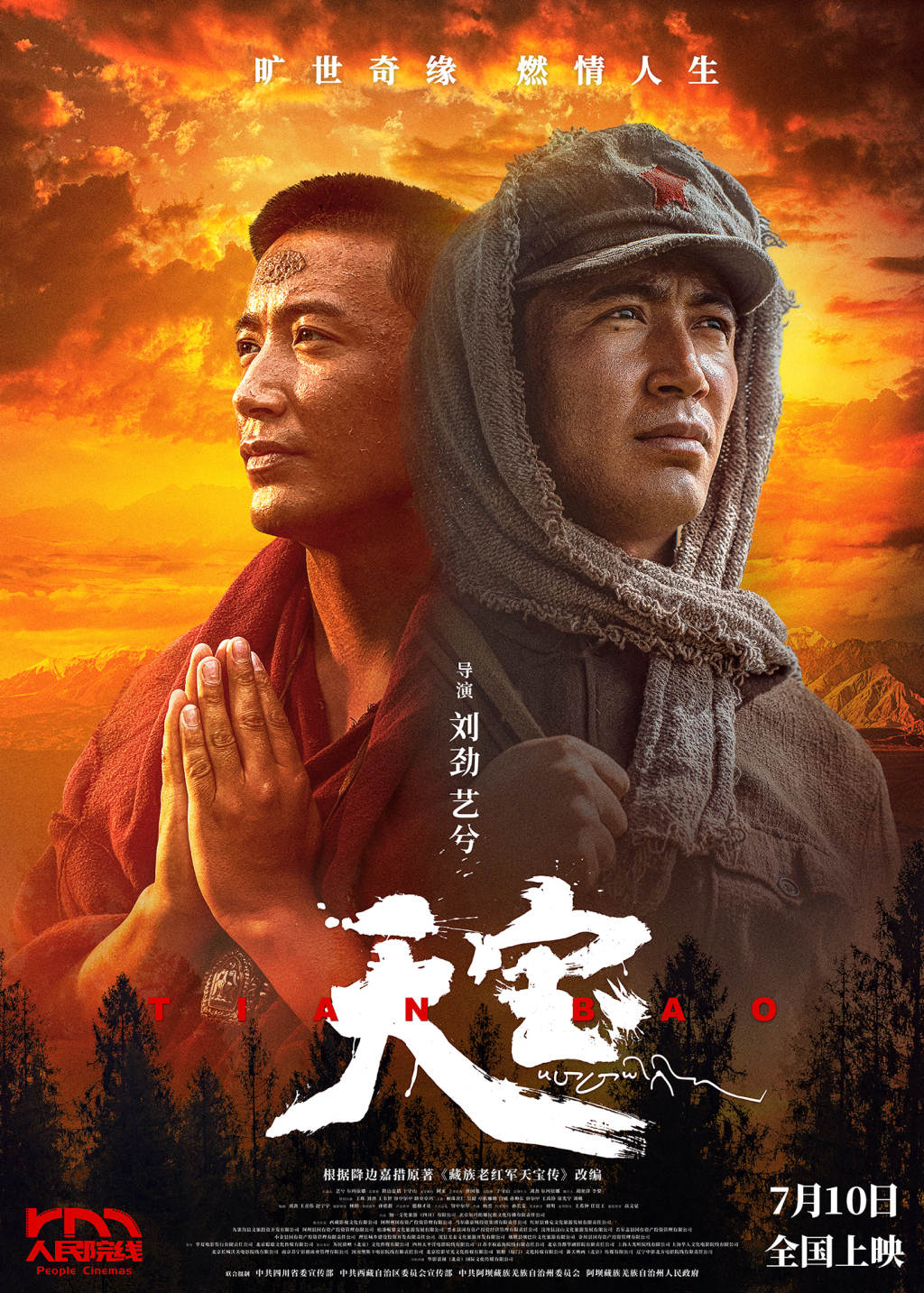
Snow-capped mountains are the curtain and history is the scroll. On July 1, the epic film "Tianbao" held a grand premiere at the China Film International Cinema next to the Museum of the History of the Communist Party of China in Beijing.
The original author Jiangbian Gyatso, the famous performing artist and director Liu Jin, the chief director Yi Xi, and the film's leading actors Dondrub Tsering, Wang Hui, Zhuoyinamu, Wu Jian and other main creative team took the stage together to tell the creative codes and the light of faith flowing behind the light and shadow.

Movie Posters
The film "Tianbao" is based on the real life experience of Tianbao (Tibetan name: Sangji Yuexi), an old Tibetan Red Army soldier. It tells the story of his participation in the Chinese revolution from his youth to middle age under the leadership of the Communist Party of China and Chairman Mao. Through Tianbao's life experience, the film shows the glorious journey of the Chinese revolution under the leadership of the Communist Party of China from low tide to high tide and from victory to victory, as well as the revolutionary spirit of the Red Army soldiers who were tenacious and brave enough to sacrifice.

Director Liu Jin is speaking. Next to him are the original author Jiangbian Gyatso (left) and director Yi Xi (right)
Director Liu Jin recalled with emotion during his speech: "Tian Bao is a work that we have been working on for six years. We have suffered a lot under the extreme conditions of hypoxia on the plateau. What keeps us going is the satisfied eyes of the audience in the future and the firm belief conveyed by Tian Bao." He said that Tian Bao is a gift to the Party’s 104th birthday, and also a consolation to all the Red Army soldiers who sacrificed on the Long March. "The spirit of the Long March is the spiritual power of the Chinese nation to overcome all difficulties!"

Movie Stills
As a director from Aba Tibetan and Qiang Autonomous Prefecture, Yi Xi talked about the original intention of his creation: "I have witnessed the integration and symbiosis of Tibetan and Qiang cultures since I was a child, which makes me admire the heroes of this land. I made "Tianbao" in the hope that his spirit will be seen by more people and remembered by history."
Jiangbian Jiacuo, the film's chief planner and the author of the original novel, said: "The biggest attraction of this film is that it reflects the spiritual outlook of an entire era through the fate of one person. Tianbao's growth is a microcosm of a generation and a true portrayal of an awakening of faith."
When asked, "Which scene made you feel restless for a long time after filming?" Director Liu Jin recalled the scene of the grassland march. "Filming was extremely difficult, and the process was full of unexpected challenges. Tianbao was saving himself and us. When the actors were stuck in the mud and the snow was blowing in their faces, they were not acting, but experiencing a spiritual long march in their bodies and minds."

Movie stills: Dondrub Tsering plays Tianbao
During the post-screening discussion, representatives of Tianbao's family collectively expressed their gratitude to Director Liu Jin: "The film was shot very well, the characters were portrayed with flesh and blood, and it showed my father's real life across time and space. Thank you to the director for his great efforts in the filming of the film, and thank you to all the cast and crew."
Luo Yuan, former deputy director of the World Military Studies Department of the Academy of Military Sciences and major general, shared precious family memories: "My father once joined the army with Uncle Tianbao. When they met many years later, Uncle Tianbao still warmly called my father 'old squad leader'. The scene of the two hugging and crying made me deeply feel the revolutionary friendship forged by our fathers' generation during the Long March."
Performing artist Tang Guoqiang spoke highly of the film: "Congratulations to Director Liu Jin for realizing his wish to bring Tianbao to the screen and write a biography for Tibetan compatriots. Whether it is the texture, costumes, props, or the selection of Tibetan actors, the film has achieved the ultimate and the degree of restoration is very high."